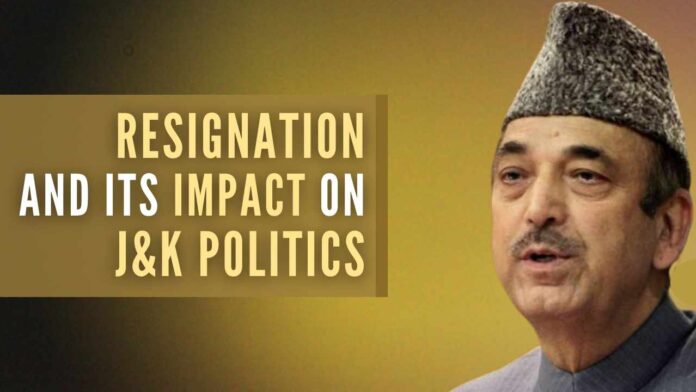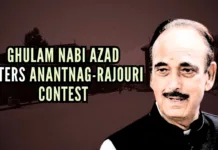
After 50 long years, Azad says goodbye to Congress
That former Leader of Opposition in RS, former Union Minister, and former J&K CM Ghulam Nabi Azad, also known as a leading member of G-23, would sever all his ties with the fast crumbling Congress sooner than later was a foregone conclusion and finally, he said goodbye to AICC interim chief Sonia Gandhi and her son Rahul Gandhi through a 5-page highly scathing letter on August 26. Azad, the mastermind behind the G-23 meeting in Jammu in 2020 and the letter that those 23 Congress leaders (read bitter critics of Sonia and Rahul) wrote to Sonia Gandhi urging her to democratize the Congress had stung, infuriated, and hurt the trio – Sonia, Rahul, and Priyanka. Ever since then, Azad had been trying to consolidate his camp, especially in J&K, looking for an opportune moment to quit the party he worked for 50 years and that opportune moment came on August 26. That day, 10 former ministers, MLAs, and MLCs, all loyal to Azad, also resigned from the primary membership of the party with Azad himself telling Times Now and Republic that he would not join any political party and that he would establish his own party. And, the August 27 reports emanated from New Delhi clinched the whole issue in this regard: Azad will establish his own national-level party in Jammu on September 4 and its first branch will be in J&K. There are reports that many Jammu-based leaders belonging to the Kashmir-based parties in general and the J&K Congress, in particular, would join the Azad outfit as the Azad supporters declared in New Delhi that its chief poll plank will be “restoration of pre-August 4, 2019 political status in J&K”.
Reactions in J&K
The resignation of Azad evoked response and reactions in J&K on expected lines. J&K BJP said that Azad was feeling suffocated in the Congress and that no person with any self-respect could work with the “Gandhi dynasty”. The BJP’s reaction and response were politically very significant and meaningful. The NC chief Farooq Abdullah and his unemployed son Omar Abdullah expressed shock over what Azad did. Farooq Abdullah even went to the extent of questioning the timing of his resignation and asking Sonia and Rahul to do something to conciliate Azad and ilk in the interest of “secularism”. Apni Party (AP) president Syed Muhammad Altaf accused on Azad “of forming his party with the blessings of BJP leadership”. Interestingly, the AP is considered in J&K “B-team of the BJP”. Significantly, neither PDP chief Mehbooba Mufti nor PC chief Sajad Lone has uttered a word on Azad’s resignation.
As for Congress, its leaders at the national and J&K levels unleashed a no-holds-barred propaganda campaign against Azad. The Congress officially said on August 26 that “GNA’s DNA Modi-fied”, that the letter that he wrote to Sonia Gandhi was actually “written by RSS” and that the invective “sycophant” was actually applicable to him. The JKPCC even went to the extent of saying that “Ghulam Nabi Azad-led group is A-team of BJP”.
Impact on J&K politics
The resignation of Azad from the Congress and his resolve to found his own outfit and open its first branch in J&K itself on September 4 will surely adversely impact the poll prospects of the Kashmir-based parties, especially the NC, the Congress, and the PDP, in the Jammu province’s Ramban, Kishtwar, Doda, Poonch, and Rajouri districts and parts of Kashmir adjoining the erstwhile Doda district. The reasons:
- The People’s Alliance for Gupkar Declaration (PAGD), which was established on August 4, 2020, by outfits like NC, PDP, Congress, CPIM, CPI, People’s Conference (PC), Awami National Conference (ANC), etc, to restore the state’s separate status as it existed between January 1950 and August 4, 2019, has almost become a story of the past, notwithstanding the statement of Farooq Abdullah to the contrary.
- The ideology, the agenda, the programme, and the core constituency of all the Kashmiri parties and the outfit that Azad will launch on September 4 will be the same.
In other words, there will be multi-cornered contests not only in Kashmir’s all 47 Assembly constituencies (all 100% Muslim-dominated) but also in the Jammu province’s at least 9 to 10 assembly constituencies in the erstwhile Doda district and border belt of Poonch and Rajouri, where the proportion of Hindus and Muslims is evenly balanced or the areas where the Muslims constitute an overwhelming majority like Poonch district, parts of Rajouri district and Banihal in Ramban district. Kashmir province and these areas in Jammu province (57 seats) will produce a fractured verdict.
Azad’s influence in Jammu limited
Then, there are at least 33 to 34 out of 43 Assembly constituencies in Jammu province where all the Kashmir-based parties have a little support base. These are Hindu-majority constituencies. The influence of Azad in these constituencies is also rather limited for reasons not really difficult to fathom. A reference to just three reasons would be in order. One is that it was during Azad’s rule that the J&K Assembly adopted Private Member’s Bills on Sharia and J&K Flag and rejected outright the Private Member’s Bills on the national flag, secularism, citizenship rights to refugees from Pakistan, the life of the Assembly from 6 to 5 years and due representation to Jammu province in the Assembly in 2007. The other is that it was also the Congress-led coalition government that snatched from the Shri Amarnath Shrine Board the Baltal land on June 28 violating the J&K High Court’s unambiguous direction – land allotted to the Board on a temporary basis for the creation of additional facilities for the Amarnath pilgrims. The fact of the matter is that it was the over 2-month-long highly popular agitation in Jammu province and other parts of India over the Amarnath land issue that led to the collapse of the Azad government on July 7, 2008. The third reason is the wrong application of the 1983 Wazir Commission Report. The report had recommended three new districts of Samba, Reasi, and Kishtwar in Jammu province and one new district of Bandipora in the Kashmir region, but the Congress-led coalition government created 4 new districts in Jammu province and an equal number of districts also in Kashmir. These were some of the factors which had led to the humiliating defeat of Azad in the Kathua-Udhampur-Doda LS constituency in May 2014 and the defeat of all the Congress candidates in all the Hindu-majority constituencies in December 2014.
It needs to be underlined that Azad had contested only three elections in J&K — two Assembly elections in 1977 and 2006 and one LS election in 2014. In 1977, he secured a paltry 959 votes from the Inderwal constituency in Jammu province and lost his security deposit. In 2014, he suffered a humiliating defeat at the hands of the BJP in the Kathua-Udhampur-Doda LS constituency in Jammu. The only Assembly election that he won was in 2006. It was, in fact, a by-election, and Azad had been J&K CM since November 2005. He won the by-election hands down from the Jammu’s Bhaderwah Assembly constituency. He defeated the BJP candidate.
Modi-Shah factor in Jammu
The Modi-Shah factor will be a dominant factor in all these 33/ 34 Hindu-majority constituencies. The Ikkjutt Jammu Party, which has been spearheading the movement for a separate Jammu State, can become a factor in certain areas in Jammu province but it will have to work hard and spread its ideas and ideology across Jammu province as fast as possible. It’s, of course, true that the Ikkjutt Jammu Party has on occasions more than one urged PM Narendra Modi to first grant statehood status to Jammu and then toy with the idea of Assembly elections. As for Aam Aadmi Party (AAP), it, like all the Kashmir-based parties, will be irrelevant both in Kashmir and Jammu province. Why? If the AAP pursues the line the Kashmiri parties pursue, it would be rejected outright in Jammu province and if it pursues the line of Modi-Shah (which it actually hates and denounces), it will be rejected outright in Kashmir. The AAP has a national ambition and J&K is a very difficult and diverse state where the political perceptions of the people professing different faiths are conflicting and mutually exclusive. Even the ruling BJP cannot reconcile these contradictions. Such is the nature of J&K UT.
In sum, it can be said that the Azad’s new outfit will only divide the Muslim votes and mar to an extent the poll prospects of the Kashmir-based parties both in Kashmir and Jammu province and it will hardly have any impact on the politics, BJP-style in Jammu province.
Note:
1. Text in Blue points to additional data on the topic.
2. The views expressed here are those of the author and do not necessarily represent or reflect the views of PGurus.
PGurus is now on Telegram. Click here to join our channel and stay updated with all the latest news and views
For all the latest updates, download PGurus App.
- ‘Kashmir My core constituency’: Revisiting July 12, 2003 to understand politics, Omar Abdullah-style - March 15, 2024
- Total deviation from traditional approach: Seven takeaways from PM Modi’s March 7 Srinagar visit - March 9, 2024
- Status of political parties: Why is further J&K reorganization imperative? - March 1, 2024











His words would be used by historians to belittle & humiliate Pappu & his exalted family !! Well is it worth ? Yes to an extent for historians. Ordinary people – it has no value. Any self respecting would never join Khangress. Having joined & served for 50 years, shedding crocodile tears & vomiting now, is laughable.
After 50 years of playing tabla to the dance steps of the Italian Bar Maid, he has no value in Kashmir
Nothing will happen. He will bite dust as others in past faced with.